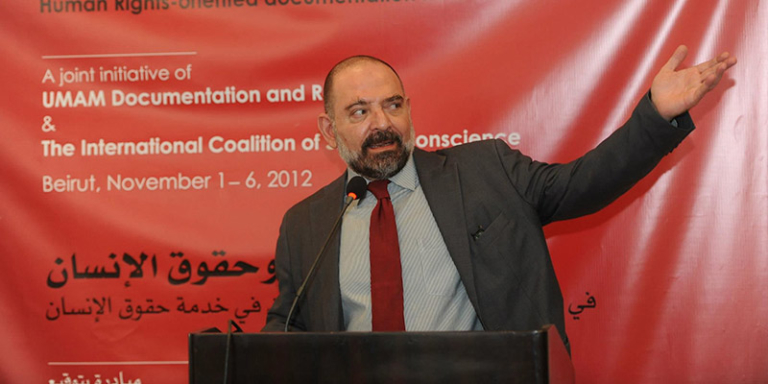
Three years ago this month, the assassination of Lokman Slim—public intellectual, human rights defender, writer and publisher, and outspoken critic of Hezbollah—rattled the Lebanese activist community. Slim was found shot dead in his car in southern Lebanon after disappearing the night before. As has happened with other politically sensitive murders in Lebanon, no serious effort has since been made to bring his killers to justice—nor has any suspect even been arrested. The judge presiding over the investigation into Slim’s killing retired in November 2023 after having only questioned three witnesses, and the primary suspects have yet to be summoned for questioning.
As with other unresolved assassinations in Lebanon, the investigation into Slim’s death has been hamstrung by authorities’ inability—or unwillingness—to investigate without angering the powers that be, specifically Hezbollah. More than simple political interference and bias, it is the prevailing culture of impunity that has enabled such heinous crimes to keep happening and has left little hope of justice ever winning out. This culture underpins the disintegration of the rule of law and the justice system in the country. It has not only bolstered the perpetrators of such crimes, but also has conveyed to activists, journalists, and public intellectuals that they should refrain from critiquing the political establishment and its patrons. As a result, Lebanon has seen a notable rise in threats and attacks on personal freedoms—freedom of expression in particular—and a proliferation of disinformation, fake news, and hate speech against opponents promoted by electronic armies, some of which have led to murder.
Lebanon has seen a notable rise in threats and attacks on personal freedoms and a proliferation of disinformation, fake news, and hate speech.
Until serious reforms are made, including protecting the judiciary from political interference, nothing is likely to change. The failure to hold perpetrators accountable and to enforce the rule of law has eliminated civic trust in the country’s institutions and leaders. Even while diplomatic efforts to avert an Israel-Lebanon war are underway, well-meaning external actors must redouble support for local initiatives to combat this dysfunction and contribute to justice and accountability. Investing single-mindedly in accountability initiatives will convey to the country’s leaders (including Hezbollah) that impunity cannot be the price paid for internal stability.
Lebanon: Where Impunity Is Prevalent, but Nobody is Guilty
The news of Lokman Slim’s murder immediately led to fingers pointing blame at Hezbollah, which had repeatedly threatened Slim for his brazen criticism of the militant group. Slim had received death threats in the form of messages accusing him of being a traitor posted at the entrance to his home in Haret Hreik, Hezbollah’s stronghold south of Beirut. At the time, Slim publicly blamed Hezbollah Secretary-General Hassan Nasrallah and Amal Movement Head and Speaker of Parliament Nabih Berri for the threats and for any ensuing violence against him. In the months before his death, Slim had become increasingly forthright about his opposition to Hezbollah. He had also advanced the theory that Hezbollah and the Syrian regime were linked to the material that caused the August 2020 Beirut Port explosion, accusing Hezbollah of holding the explosives for the Syrian government. Slim was kidnapped in the area of operations of the United Nations Interim Force in Lebanon (UNIFIL) in southern Lebanon, where he had been heavily monitored by Hezbollah. After his killing, Slim was gruesomely targeted in death on social media, becoming the focus of a severe hate campaign on Facebook in which people insulted him and extolled Hezbollah for “taking the trash out.” Even more notably, Jawad Nasrallah, the son of Hezbollah’s leader, posted and then retracted a tweet saying “The loss of some people is in fact an unplanned gain #notsorry.”
Slim’s killing is one in a long string of assassinations of politicians, activists, and journalists in Lebanon that dates back to the attempted murder in 2004 of former economy minister Marwan Hamadeh, followed by the dramatic assassination in 2005 of Prime Minister Rafiq Hariri, who at the time was challenging the Syrian presence in Lebanon amidst growing tensions with President Bashar al-Assad. The United Nations’ Special Tribunal for Lebanon appointed to investigate Hariri’s assassination—which triggered the largest protests in Lebanon’s history—ended with a watered-down verdict that fell short of accusing Hezbollah of Hariri’s murder by finding one of its mid-level operatives, Salim Ayyash, guilty in absentia. Ayyash remains at large and Lebanese authorities cannot apprehend him because Nasrallah rejected the jurisdiction of the tribunal, its verdict, and the party’s responsibility. The tribunal found no conclusive evidence linking Hezbollah’s leadership to Hariri’s killing. Another operative, Mustafa Badreddine, was also found guilty but was killed in Syria in 2016.
Although the tribunal was a well-intentioned attempt to address the lacuna of justice in Lebanon, it became a failure within the context of broader state collapse.
Although the tribunal was a well-intentioned attempt to address the lacuna of justice in Lebanon, and did issue a verdict, it became a failure within the context of broader state collapse and Hezbollah’s unfettered influence on Lebanon’s state institutions, economy, and society. Incidentally, two prominent security officials who helped with the tribunal’s investigation, Wissam Eid and Brigadier General Wissam al-Hassan, were assassinated by car bombs in 2008 and 2012, respectively. Investigations into their deaths were never concluded.
Another epic failure of justice was the investigation into the August 2020 Beirut Port explosion, which occurred only six months before Slim’s brutal murder. The deadly explosion, which killed at least 220 people and injured more than 6,000, occurred when tons of improperly stored ammonium nitrate blew up. With a massive paper trail and an insistent public demand for accountability, the port bombing outraged the world, but no progress in the investigation has been reported to date. Fingers here naturally pointed once again to Hezbollah, which controls the port and has used it to smuggle narcotics, including Captagon, and other contraband to bankroll its activities. (In addition, Lebanese authorities are widely suspected of diverting some of the ammonium nitrate stored in the port to the Assad regime.)
But if the blast exposed the magnitude of Lebanon’s corruption, the ruling class’s maneuvers to eschew accountability since the disaster have made matters worse. Indeed, Hezbollah has been the investigation’s biggest detractor, accusing Judge Tarek Bitar of using “the blood of victims to serve political interests” and calling for his removal. Administrative interference has derailed productive tracks of investigation, leading to the investigation’s suspension in December 2022. In January 2023, Lebanon’s top prosecutor Ghassan Oueidat illegally ordered the release of all suspects detained and revoked at least one arrest warrant. This marked yet another failure to disrupt the system of impunity pervading Lebanese politics and underscored the alarming reality that the judicial system operates in the service of the authorities, who have a vested interest in truth never seeing the light of day.
The violence that has dominated post-civil war Lebanon—most of it unprosecuted, let alone properly investigated—has given the country’s politicians opportunities to trade sectarian and political blame while enabling them to dodge any attempt at establishing truth. As a result, Lebanon has become a country where corruption is unchecked, yet nobody is corrupt, and where impunity is rife, but nobody is guilty. Truth unfortunately lies not in what Lebanon has done, but what it has not done.
Can Impunity Be the Price of Stability?
Accountability and justice in Lebanon are routinely put off because the costs of truth and justice are perceived to outweigh the benefit of stability. As a result, persistent political insecurity, a corrupt judiciary, and the absence of rule of law have all led to a situation of status-quo impunity. Lebanese civil society activists are stuck in the unfortunate situation of having to advocate for accountability within a system dominated by the very perpetrators of crimes and corruption—members of the ruling establishment and Hezbollah—whose interests are threatened by the accountability sought.
Lebanese civil society activists have to advocate for accountability within a system dominated by the very perpetrators of crimes and corruption.
When protesters took to the streets in 2019 after a series of catastrophic events that culminated in the collapse of Lebanon’s banking system, they demanded not economic reform or the return of their savings but an overhaul of the country’s system of governance. Such an overhaul means not just an election, a new cabinet, and the recovery of stolen funds, but also structural change to break the sectarian, patronage-based elite system. Protestors marched for social justice and socio-economic improvements, political and economic rights, and accountability for corruption and other crimes from which the Lebanese had suffered for decades. The popular slogans “kullun yaani kullun” (all means all) and “Nasrallah is one of them,” denounced, in a striking show of unity and cohesion, the entire political class that had accumulated wealth through unaccountable financial gains, mismanagement of public funds, and illicit profits.
The protests were met with violence and intimidation—including confrontations with Hezbollah and Amal supporters infamously shouting “Shia, Shia, Shia”—and a counter-revolution that vilified, delegitimized, and even coopted these protests and ultimately led to their demobilization. Although the protest movement died out, its essence was channeled into grassroots civic mobilization to help rebuild (as after the Beirut port blast), recreate alternative networks of support, deliver services, and promote measures to strengthen accountability.
No Future Without Accountability
While Lebanon’s foreign benefactors and donors have long promoted reform, their demands have fallen short of revamping the underlying system of patronage that makes possible not just widespread corruption and impunity but also political stalemate. Impunity cannot be the price the Lebanese pay for stability. The best tool against abuse, crime, and corruption is a society built on respect for human rights.
While accountability must be a central focus of support for Lebanon, any well-meaning approach must be willing to address the root causes of Lebanon’s predicament. There is the question, for example, of whether an economic bailout—such as through an International Monetary Fund loan, as is being considered—would not simply provide a lifeline to the same political class who made the country’s economic collapse possible in the first place. Concrete steps to strengthen the rule of law and transform the imperiled judiciary, including tying economic assistance to judicial reforms, are preconditions for the initiation of long-awaited accountability and truth-telling mechanisms. These must tackle Hezbollah’s capture of the judiciary and its contribution to the perpetuation of impunity.
Otherwise, the cruel fate of victims like Lokman Slim, a tireless advocate for truth and fearless crusader for freedom, dignity, and peace, will be for naught. As detached as such concerns may seem from Lebanon’s current fears of an impending war with Israel, it is only by guaranteeing justice for Slim and other victims of political assassination—including the port blast victims—that Lebanon can begin to confront its impunity conundrum.
The views expressed in this publication are the author’s own and do not necessarily reflect the position of Arab Center Washington DC, its staff, or its Board of Directors.

